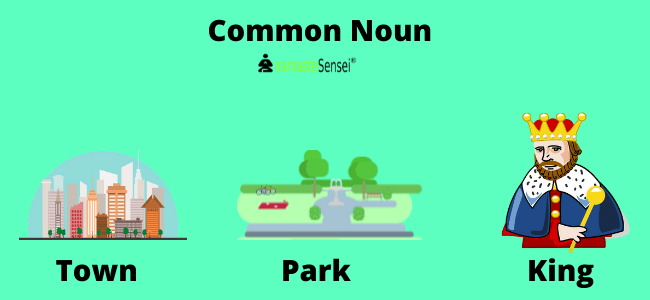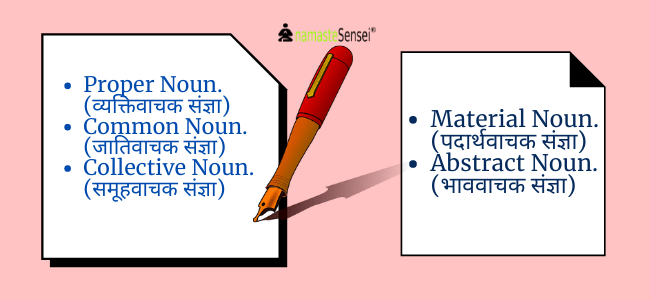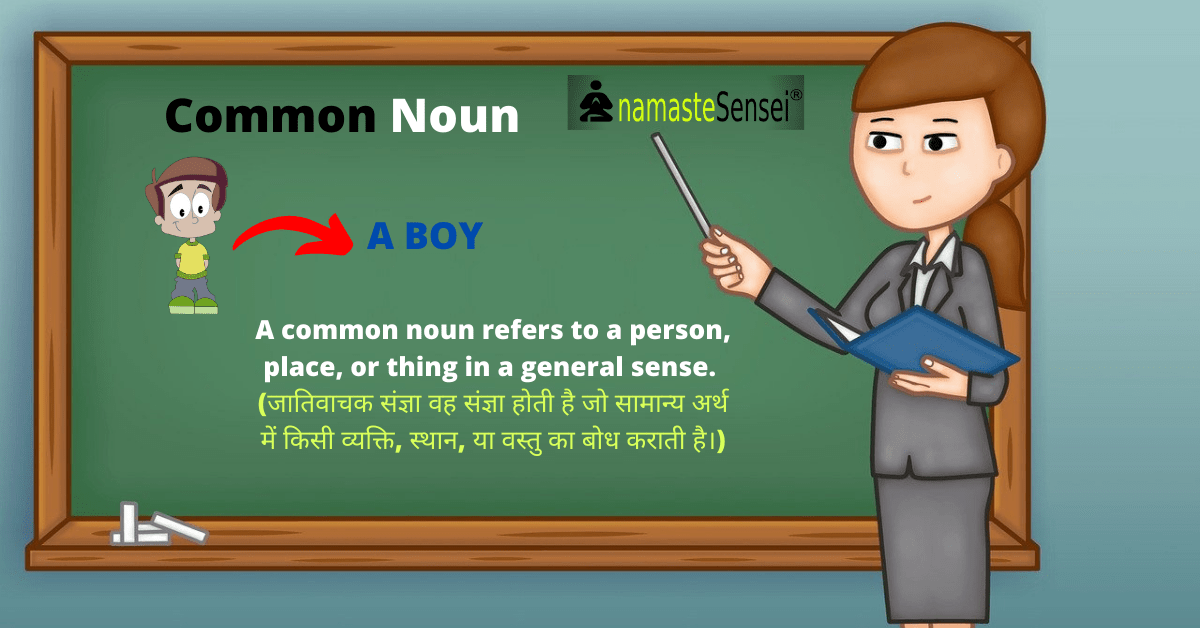Common Noun in Hindi | Definition of common noun
जातिवाचक संज्ञा

Common Noun In Hindi – संज्ञा का उपयोग English Grammar का एक बहुत महत्वपूर्ण अंग है। उचित संज्ञाओं का उपयोग आपके लेखन को सही ढंग से स्पष्ट करता है, और यह सुनिश्चित करता है कि पाठक ठीक से जानते हैं कि आप किस बारे में बात कर रहे हैं। Common noun (जातिवाचक संज्ञा) का usage इसीलिए अन्य संज्ञाओं की तरह महत्वपूर्ण माना गया है।
What is Common noun Definition?
- A common noun refers to a person, place, or thing in a general sense.
जातिवाचक संज्ञा वह संज्ञा होती है जो सामान्य अर्थ में किसी व्यक्ति, स्थान, या वस्तु का बोध कराती है।
Example
| “I live in a city.” “मेरा निवास एक शहर में है।”
Here ‘city’ refers to the ‘place’ in a general sense. Advertisements
|
| “We met some people.” “हम कुछ लोगों से मिले।”
Here ‘People’ refers to the ‘person’ in a general sense. |
| “She went into politics.” “वह राजनीति में चली गई।” |
| “Our teacher is angry.” “हमारे शिक्षक नाराज हैं।” |
| “Let’s go down to the lake.” “चलो नीचे झील पर चलते हैं।” |
- A common noun is written with a capital letter when it begins a sentence.
जब जातिवाचक संज्ञा को वाक्य के प्रारंभ में प्रयोग किया जाए तब जातिवाचक संज्ञा बड़े अक्षर से लिखी जाती है।
Example
| “Chair is made of wood.” कुर्सी लकड़ी की बनी होती है। Here Chair(Common Noun) is used at beginning of the sentence. Therefore, a capital letter is used. |
Example of Common noun in Hindi
जातिवाचक संज्ञा उदाहरण
Examples
We explained some common noun examples in Hindi and English below.
हमने नीचे हिंदी और अंग्रेजी में कुछ जातिवाचक संज्ञा उदाहरणों की व्याख्या की है।
- The nearest town is 150 km away from here.
निकटतम शहर यहां से 150 किमी दूर है। - All the parks are closed today.
आज सभी पार्क बंद हैं। - The King makes laws for his people.
राजा अपनी प्रजा के लिए कानून बनाता है।
- Town (शहर), Parks (पार्क), King (राजा) उपरोक्त वाक्यों में जातिवाचक संज्ञा के उदाहरण है।
Usage of Common Noun In Hindi
जातिवाचक संज्ञा का प्रयोग
-
Titles मैं जातिवाचक संज्ञा का उपयोग
- If the common noun is the title of a job or family member and is used in place of a person’s name, it should always be capitalized.
यदि (Common noun) जातिवाचक संज्ञा नौकरी या परिवार के सदस्य का Title है और किसी व्यक्ति के नाम के स्थान पर प्रयोग किया जाता है, तो इसे हमेशा Capital किया जाना चाहिए।
Example
| “How are you doing, Coach?” “आप कैसे हैं, कोच?” |
| “I need your advice, Mr. President.” “मुझे आपकी सलाह चाहिए, श्रीमान राष्ट्रपति।” |
| “Can you come with me, Mom?” “क्या तुम मेरे साथ आ सकती हो, माँ?” |
| “Pleased to meet you, Doctor.” “आपसे मिलकर खुशी हुई, डॉक्टर।” |
- Compare the examples above to the following examples below in which the same titles of jobs and family members are not used to address the person directly, and therefore are not capitalized.
ऊपर दिए गए उदाहरणों की तुलना निम्नलिखित नीचे दिए गए उदाहरणों (examples) से करें, जिनमें jobs और family members के Titles व्यक्ति को सीधे संबोधित करने के लिए उपयोग नहीं किए जाते हैं, और इसलिए Capital नहीं होते हैं।
Example
| “Give that football to the coach.” “वह फुटबॉल कोच को दे दो।” |
| “Was the president at the meeting?” “क्या अध्यक्ष बैठक में थे?” |
| “Tell your mom to come with us.” “अपनी माँ को हमारे साथ आने के लिए कहो।” |
| “Did you call the doctor yet?” “क्या आपने अभी तक डॉक्टर को फोन किया है?” |
- In the above examples, Common Noun(Coach, President, Mom, and Doctor) are not capitalized as they were not addressing titles of job and family members.
उपरोक्त उदाहरणों में, जातिवाचक संज्ञा(common Noun) (कोच, अध्यक्ष, माँ और डॉक्टर) को बड़े अक्षरों (capital letter) में नहीं लिखा गया है क्योंकि वे नौकरी और परिवार के सदस्यों के शीर्षक(title) को संबोधित नहीं कर रहे थे।
12 Sentence example of Common noun in hindi

Some of the examples of common noun sentences in Hindi and English.
हिंदी और अंग्रेजी में कुछ जातिवाचक संज्ञा उदाहरण।
- Girls are playing in the garden.
लड़कियां बगीचे में खेल रही हैं। - He has two siblings.
उसके दो भाई-बहन हैं। - He loves reading books.
उसे किताबें पढ़ना पसंद है। - The government is providing free laptops to students.
सरकार छात्रों को मुफ्त लैपटॉप मुहैया करा रही है। - There are a lot of mountains in the Himalayas.
हिमालय में बहुत सारे पहाड़ हैं। - Children go to school by bus.
बच्चे बस से स्कूल जाते हैं। - We will catch you by train.
हम आपको ट्रेन से पकड़ लेंगे। - The city has extreme traffic.
शहर में अत्यधिक ट्रैफ़िक है। - His grandmother died when he was young.
जब वह छोटा था तब उसकी दादी की मृत्यु हो गई थी। - When I was young, my father used to drop me by the school.
जब मैं छोटा था तो मेरे पिता मुझे स्कूल छोड़ देते थे। - Women like men with good physiques.
महिलाओं को अच्छी काया वाले पुरुष पसंद आते हैं। - Let’s have a party at a nearby restaurant.
चलो पास के एक रेस्तरां में पार्टी करते हैं।
Other Types of Noun in Hindi (संज्ञा के प्रकार)

-
What are the different types of nouns?
संज्ञा के विभिन्न प्रकार क्या हैं?
There are 7 types of nouns including Common Noun.
संज्ञा सात प्रकार के होते हैं।
- Proper Noun.
व्यक्तिवाचक संज्ञा - Common Noun.
जातिवाचक संज्ञा - Collective Noun.
समूहवाचक संज्ञा - Material Noun.
पदार्थवाचक संज्ञा - Abstract Noun.
भाववाचक संज्ञा - Countable Noun.
गणनीय संज्ञा - Non Countable Noun.
गैर-गणनीय संज्ञा
आप नीचे दिए गए लेख में संज्ञा के अन्य प्रकारों के बारे में पढ़ सकते हैं।
जरूर पढ़ें – ‘Noun and types of noun ( संज्ञा और उसके प्रकार)’.
बधाई हो, आपने पूरा लेख पढ़ा। यदि आपके कोई संदेह या प्रश्न हैं, तो बेझिझक नीचे टिप्पणी करें। हम जितनी जल्दी हो सकेगा संपर्क करेंगे।
अधिक लेख:
| Countable Noun In Hindi | Proper Noun In Hindi |
| Collective Noun In Hindi | Abstract Noun In Hindi |
| Compound Noun In Hindi | Material Noun In Hindi |
Any topic you want us to cover. Let us know.

Very very informative
We are thankful for the feedback.